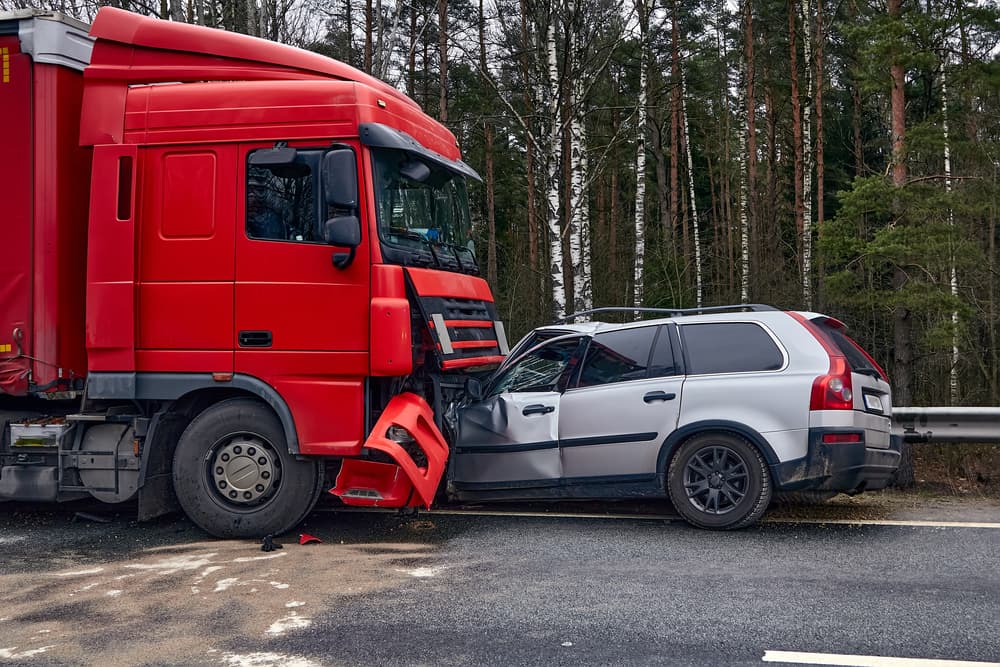Many injuries suffered in trucking accidents can be devastating, leading to long-lasting effects on a victim’s life. Understanding the severity of these injuries helps get through the aftermath and seek appropriate medical and legal assistance.
From head and spinal injuries to broken bones and internal trauma, the range of injuries can be extensive and severe. The following looks at the injuries victims suffer in trucking accidents, the factors influencing their severity, and the legal and medical considerations you should understand.
No matter what type of injuries you suffered in your truck crash, you should never hesitate to learn about your legal options. After seeking initial medical attention, consult a truck accident lawyer for a free consultation right away.
Types of Injuries in Trucking Accidents
About 119,000 people suffered severe injuries in commercial truck collisions in the U.S. in a recent year. Further, trucking accidents are known for their potential to cause a wide range of injuries.
From head trauma to psychological distress, the aftermath of a trucking accident can leave you facing significant physical, emotional, and financial challenges. The following is a look at the various types of injuries suffered in trucking accidents and their potential impacts.

Head Injuries
Head and brain injuries are among the most severe and life-altering consequences of trucking accidents. Concussions, caused by the brain hitting the skull due to sudden impact or acceleration-deceleration forces, can result in temporary loss of consciousness, headaches, dizziness, and cognitive difficulties.
Traumatic brain injuries are more severe and can lead to long-term cognitive impairment, memory loss, and changes in behavior. Skull fractures, which occur when the skull bone is broken due to a powerful impact, can result in severe head trauma and require immediate medical attention.
Spinal Cord Injuries
Spinal cord injuries are another devastating consequence of trucking accidents. Herniated discs, spinal fractures, and paralysis (such as paraplegia or quadriplegia) can occur when the spinal cord suffers damage due to compression or trauma.
These injuries often lead to permanent disabilities, affecting mobility and independence for the rest of your life.
Neck and Back Injuries
Neck and back injuries are common in trucking accidents, often caused by a collision’s sudden jolt or impact.
Whiplash, characterized by neck pain and stiffness, is a common injury resulting from the rapid back-and-forth movement of the head and neck. Cervical and lumbar strains and disc injuries can cause persistent pain and limit your ability to perform everyday activities.
Broken Bones
Broken bones and fractures frequently occur in trucking accidents, particularly in high-impact collisions. Rib fractures, pelvic fractures, and limb fractures can occur during a crash.
These injuries often require extensive medical treatment, including surgery and rehabilitation, and can result in long-term complications such as chronic pain and limited mobility.
Internal Injuries
Many people overlook internal injuries, such as organ damage, internal bleeding, and abdominal injuries. However, untreated internal injuries suffered in trucking accidents can kill.
A truck hitting a passenger vehicle can cause organs such as the liver, spleen, and kidneys to rupture or bleed, leading to serious medical complications and even death if left untreated.
Soft Tissue Injuries
Soft tissue injuries, including contusions, sprains, and strains, are common in trucking accidents. These injuries can cause significant pain and discomfort and may require ongoing medical treatment and physical therapy to recover fully.
Psychological Impacts
Finally, trucking accidents can also result in psychological injuries, including post-traumatic stress disorder (PTSD), anxiety, depression, and emotional distress.
The emotional trauma of being involved in a serious accident can have long-lasting effects on your mental health and well-being, diminishing your ability to work, socialize, and enjoy life.
Overall, the types of injuries suffered in trucking accidents can vary widely in severity and complexity. Seek immediate medical attention and legal guidance after a trucking accident to receive the necessary treatment and support to recover physically, emotionally, and financially.
Factors Influencing Injury Severity

When it comes to trucking accidents, the severity of injuries can vary widely depending on several key factors. A lawyer who understands these factors can assess the harm caused by such accidents and the potential for recovery.
Here are some important considerations that influence the severity of injuries in trucking accidents:
Speed and the Impact Force
The speed and force of impact play a significant role in determining the severity of injuries sustained in a trucking accident. High-speed collisions can result in more extensive damage to vehicles and occupants, increasing the likelihood of severe injuries.
The impact can throw occupants about the vehicle, leading to traumatic injuries such as head trauma, spinal cord injuries, and fractures.
Size and Weight Differences
The size and weight disparity between trucks and other vehicles also contribute to injury severity in trucking accidents. Trucks are significantly larger and heavier than passenger vehicles, which means they can cause more damage in a collision.
The sheer size and weight of trucks make occupants of smaller vehicles at greater risk of serious injury in accidents.
Safety Equipment
Safety equipment, such as seat belts and airbags, can help mitigate injury severity in trucking accidents. Seat belts restrain occupants and prevent them from being ejected from the vehicle during a crash, while airbags provide additional protection against impact forces.
However, failure to use safety equipment or defects in safety systems can increase the risk of injury in a trucking accident.
Vehicle Design
Vehicle design and safety features also play a role in injury severity. Manufacturers design modern vehicles with various safety features, such as crumple zones, reinforced frames, and advanced driver assistance systems designed to minimize injury during a crash.
Vehicles with inadequate safety features or design flaws may result in more severe injuries for occupants involved in trucking accidents.
Other Factors
Driver fatigue, distraction, or impairment can significantly impact the severity of injuries in trucking accidents. Fatigued or distracted drivers are likely to make errors behind the wheel, increasing the risk of accidents and injuries.
Similarly, drivers impaired by alcohol, drugs, or medication may have slower reaction times and impaired judgment, leading to more severe accidents and injuries.
By understanding these factors, you can better appreciate the potential risks associated with trucking accidents.
Long-Term Consequences of Trucking Accident Injuries
The types of injuries suffered in trucking accidents often have long-term consequences, affecting various aspects of a victim’s life. These are just a few of the long-term consequences victims of trucking accidents may face:
Chronic Pain
Chronic pain and disability are common outcomes of trucking accident injuries, particularly those involving head trauma, spinal cord injuries, and fractures.
Chronic pain can significantly reduce your quality of life and limit your ability to perform everyday activities. Disabilities resulting from trucking accident injuries may require ongoing medical treatment, rehabilitation, and assistance with daily tasks.
Loss of Independence
Loss of mobility and independence can occur as a result of severe injuries sustained in trucking accidents. Spinal cord injuries, paralysis, and limb amputations can restrict your ability to move freely and perform tasks independently.
Dependence on mobility aids such as wheelchairs or walkers may be necessary, impacting one’s ability to participate in activities one once enjoyed and reducing one’s overall independence.
Mental Health Issues
The psychological trauma and mental health issues mentioned above often accompany trucking accident injuries, particularly for those who experience traumatic events.
Mental health conditions can develop because of the emotional trauma of a horrific event. These psychological issues can profoundly degrade your well-being and quality of life.
Potential Job Impacts
The impact of trucking accident injuries extends beyond physical and psychological consequences and can affect your personal and professional life.
Injuries may prevent you from returning to work or performing your duties effectively, resulting in loss of income and career setbacks. In addition, the strain of coping with injuries and recovery may take a toll on your relationships with family and friends.
Financial Problems
Another significant long-term consequence of trucking accident injuries is the financial burden of medical bills and lost income. Medical expenses associated with treating injuries, ongoing rehabilitation, and assistive devices can quickly accumulate, placing a strain on your finances.
Lost income due to time taken off work for recovery can further worsen financial difficulties, leading to stress and uncertainty about the future.
As you can see, the long-term consequences of trucking accident injuries can be profound and far-reaching, affecting various aspects of your life.
Getting appropriate medical treatment, support, and legal guidance following a trucking accident is crucial in reducing these consequences and obtaining the assistance you need to rebuild your life.
By understanding the potential long-term effects of trucking accident injuries, you can take proactive steps to address them and work toward recovery and healing.
Legal and Medical Considerations After a Truck Accident

Experiencing injuries from a trucking accident can lead to critical legal and medical considerations. You must address these concerns to ensure your well-being and protect your rights. Here’s what you need to know:
Medical Help
After a trucking accident, the first step is seeking medical attention and documenting injuries. Even if you don’t think your injury is severe, you must see a doctor. Some injuries can take days or weeks to show symptoms.
Documenting your injuries through medical records, photographs, and detailed notes can strengthen your case and provide evidence of the harm you’ve suffered.
Legal Help
Consulting a truck accident attorney is essential when dealing with the legal issues of a trucking accident case. An experienced attorney can guide you, assess your case’s strength, and fight on your behalf to ensure you receive fair compensation for your injuries and damages.
They can also explain your legal rights and options for pursuing compensation.
An Experienced Truck Accident Lawyer Must Investigate the Accident
A lawyer can also gather and preserve evidence, which is critical in trucking accident cases. This includes collecting information such as police reports, witness statements, and photographs of accident scenes and vehicle damage.
Preserving evidence strengthens your case when pursuing legal action against the responsible parties.
Understanding your rights and options for pursuing compensation is essential in trucking accident cases. Depending on the circumstances of the accident, you may recover compensation for medical expenses, lost income, pain and suffering, and other damages. An attorney can handle the legal process and determine the best action to seek compensation.
While you should always prioritize your health and well-being after a trucking accident, you must also consider the legal aspects of your situation.
Seek medical attention promptly, consult a truck accident attorney, and preserve evidence to pursue justice and get the money you deserve for your injuries and damages.
Speak With a Truck Accident Lawyer Immediately
If you suffer from injuries after a trucking accident, speak with a personal injury attorney immediately. The faster you contact a lawyer, the better your chances of maximum compensation.
The following are some of the reasons time is of the essence regarding legal help:
- Preservation of evidence: Critical evidence, such as skid marks, vehicle damage, and road conditions, can deteriorate or disappear quickly. By engaging a truck accident lawyer early on, they can act swiftly to gather and preserve crucial evidence that may be vital to your case.
- Understanding your rights: Trucking accidents involve complex legal regulations and liability issues. A truck accident lawyer can help you understand your legal rights and options for pursuing compensation. They can explain relevant laws and statutes that may apply to your case, ensuring you make informed decisions about how to proceed.
- Investigation and documentation: Truck accident attorneys have the resources and experience to conduct thorough investigations into trucking accidents. They can interview witnesses, obtain accident reports, and analyze evidence to build a strong case on your behalf. Additionally, they can document your injuries, medical treatment, and other damages to support your compensation claim.
Please don’t delay seeking legal representation – act quickly to ensure the best possible outcome for your case.
